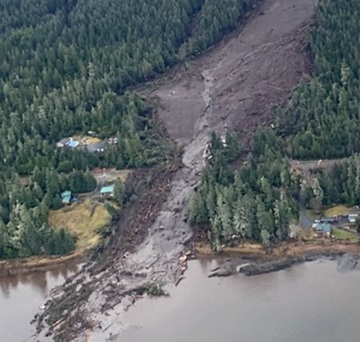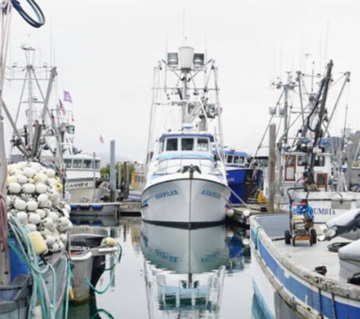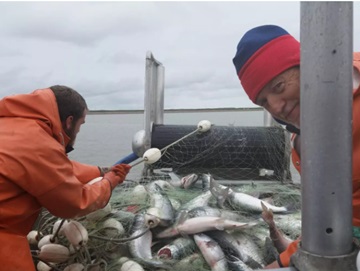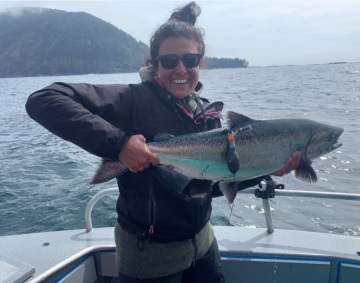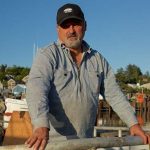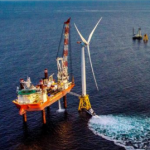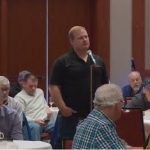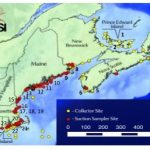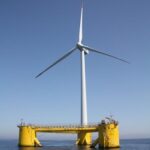Category Archives: North Pacific
When a Coast Guard helicopter crashed in Southeast Alaska, first on the scene were the helicopter crashed it came to rescue
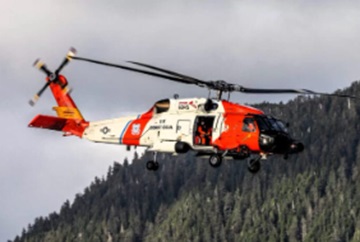 The first people at the scene of Monday night’s crash of an Air Station Sitka helicopter were the crew of the distressed fishing vessel it was sent to assist. The two brothers aboard the Lydia Marie played a critical role in the rescue of the downed air crew. Logan Padgett is the captain of the Lydia Marie, a 44-foot wooden troller based in Wrangell. The Lydia Marie began taking on water around 8 p.m. Monday in the rough seas of Frederick Sound. Padgett sent out a mayday and steered for the protected northern shore of Read Island in Farragut Bay. >>click to read<< 08:05
The first people at the scene of Monday night’s crash of an Air Station Sitka helicopter were the crew of the distressed fishing vessel it was sent to assist. The two brothers aboard the Lydia Marie played a critical role in the rescue of the downed air crew. Logan Padgett is the captain of the Lydia Marie, a 44-foot wooden troller based in Wrangell. The Lydia Marie began taking on water around 8 p.m. Monday in the rough seas of Frederick Sound. Padgett sent out a mayday and steered for the protected northern shore of Read Island in Farragut Bay. >>click to read<< 08:05
Ordinary Heroes: Fishermen Turn Rescuers in Treacherous Seas – In the midst of a treacherous night at sea, the crew of the fishing vessel Lydia Marie found themselves unexpectedly shifting roles from the ones in need of rescue to becoming the rescuers. Captain Logan Padgett and his younger brother, ordinary fishermen, were thrust into action to aid the downed air crew of an Air Station Sitka helicopter. >>click to read<< 11:24
Kongsberg Discovery Partners with Arctic Storm for Advanced US-built Trawler-processor
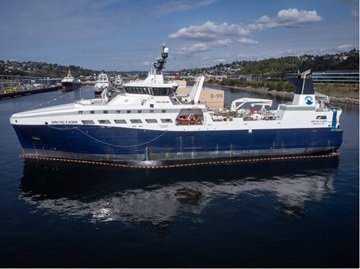 The first US-built trawler-processor for Alaskan pollock in over three decades is now undergoing sea trials in the Northern Pacific, testing an integrated technology package from Kongsberg Discovery tailored to locate, inspect, and engage fish with unparalleled efficiency. The 100-meter-long Arctic Fjord, designed by Kongsberg Maritime and built by Louisiana’s Thoma-Sea Marine Constructor, will start full-time operations for 2024’s pollock A season in the Bering Sea. “The Arctic Fjord sets a new benchmark for the Alaskan pollock fleet,” Woodruff comments. “From its fuel-efficient design to the outstanding crew accommodation and state-of-the-art onboard processing facilities, every element has been cherry picked to not just do the job, but to do it to the highest possible standards. >>click to read<< 09:50
The first US-built trawler-processor for Alaskan pollock in over three decades is now undergoing sea trials in the Northern Pacific, testing an integrated technology package from Kongsberg Discovery tailored to locate, inspect, and engage fish with unparalleled efficiency. The 100-meter-long Arctic Fjord, designed by Kongsberg Maritime and built by Louisiana’s Thoma-Sea Marine Constructor, will start full-time operations for 2024’s pollock A season in the Bering Sea. “The Arctic Fjord sets a new benchmark for the Alaskan pollock fleet,” Woodruff comments. “From its fuel-efficient design to the outstanding crew accommodation and state-of-the-art onboard processing facilities, every element has been cherry picked to not just do the job, but to do it to the highest possible standards. >>click to read<< 09:50
Coast Guard helicopter crash in Southeast Alaska injures 4 crew members
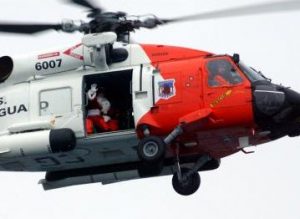 A U.S. Coast Guard helicopter crashed late Monday on an island in Southeast Alaska, and all four people aboard survived, officials said. The Sitka-based MH-60T Jayhawk helicopter crashed on Read Island during a search and rescue mission, U.S. Coast Guard Alaska wrote in a statement Tuesday. The crew members were being treated for serious injuries, the statement said. A crashed on Read Islandfishing vessel reported the crash around 11:05 p.m., according to the statement. The boat had been flooding and was receiving help from the Coast Guard. Two Coast Guard cutters responded to the area to help the flooding fishing vessel and established a security zone around the helicopter crash, the statement said. This is a developing story. >>click to read<< 15:59
A U.S. Coast Guard helicopter crashed late Monday on an island in Southeast Alaska, and all four people aboard survived, officials said. The Sitka-based MH-60T Jayhawk helicopter crashed on Read Island during a search and rescue mission, U.S. Coast Guard Alaska wrote in a statement Tuesday. The crew members were being treated for serious injuries, the statement said. A crashed on Read Islandfishing vessel reported the crash around 11:05 p.m., according to the statement. The boat had been flooding and was receiving help from the Coast Guard. Two Coast Guard cutters responded to the area to help the flooding fishing vessel and established a security zone around the helicopter crash, the statement said. This is a developing story. >>click to read<< 15:59
Lawmakers form Seafood Caucus to help Louisiana fishermen
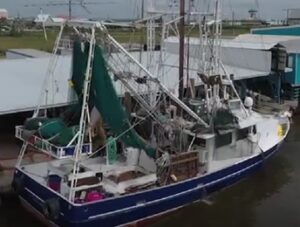 Consumers likely don’t think twice about where the shrimp or seafood bought at grocery store comes from, but Louisiana fisherman—and now federal lawmakers—are asking people to pay attention. “We’re losing an industry and a culture and a way of life in Louisiana and across the country,” said Acy Cooper, who comes from a long line of shrimpers. He says what was once a reliable profession has now become heartache. It’s not just a problem in Louisiana—which is why lawmakers from all four of the country’s coasts are joining together to find a solution. Video, >>click to read<< 10:28
Consumers likely don’t think twice about where the shrimp or seafood bought at grocery store comes from, but Louisiana fisherman—and now federal lawmakers—are asking people to pay attention. “We’re losing an industry and a culture and a way of life in Louisiana and across the country,” said Acy Cooper, who comes from a long line of shrimpers. He says what was once a reliable profession has now become heartache. It’s not just a problem in Louisiana—which is why lawmakers from all four of the country’s coasts are joining together to find a solution. Video, >>click to read<< 10:28
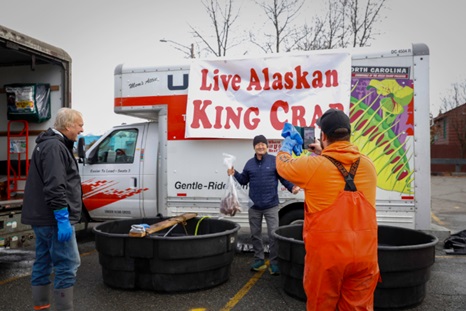
Alaska crabbers get creative with pop-up sales, but industry’s fate uncertain
With Alaska’s Bering Sea snow crab fishery shut down for the second year in a row, crabbers are having to make tough decisions and find creative ways to earn income, like selling direct to Anchorage consumers, sometimes in parking lots. A hand-painted sign on an Anchorage street corner and a hanging sign with the words “Live Alaskan King Crab” were enough to draw in customers to a Spenard parking lot that had become home to one of the shellfish pop-up sales. The live crab sale was in its fourth day on Nov. 2 and had already sold more than three-quarters of the 700 red king crabs hauled out from the Bering Sea. In an attempt to make up some lost income, third-generation fisherman Gabriel Prout brought red king crab to Anchorage to sell directly to consumers. Photos, >>click to read<< 09:16
Commercial Fisherman Robert Maxwell “Bob” Salter of Santa Cruz, California has passed away
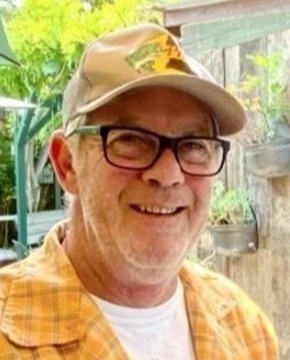 Family and friends are mourning the loss of beloved uncle and trusted friend, Bob Salter, who passed away at his Santa Cruz home with his loving family at his bedside. Bob was born in Santa Cruz to Frederick Salter and Fern Rianda Salter, he attended Delaveaga, B40, and Harbor High School. His father taught Bob the joy of fishing and love of the Sea. He grew up surfing and fishing with his brother Gary. His former boat was the Francis Jolene in the Santa Cruz Harbor. He fished for many seasons in Alaska and would visit family in Canada along the way. Bob had a lifelong career of commercial fishing and most recently fished out of Santa Cruz Harbor with Rick Ryan and his niece Bonnie Salter. >>click to read<< 10:27
Family and friends are mourning the loss of beloved uncle and trusted friend, Bob Salter, who passed away at his Santa Cruz home with his loving family at his bedside. Bob was born in Santa Cruz to Frederick Salter and Fern Rianda Salter, he attended Delaveaga, B40, and Harbor High School. His father taught Bob the joy of fishing and love of the Sea. He grew up surfing and fishing with his brother Gary. His former boat was the Francis Jolene in the Santa Cruz Harbor. He fished for many seasons in Alaska and would visit family in Canada along the way. Bob had a lifelong career of commercial fishing and most recently fished out of Santa Cruz Harbor with Rick Ryan and his niece Bonnie Salter. >>click to read<< 10:27
OPINION: North Pacific Fishery Management Council is acting to reduce bycatch
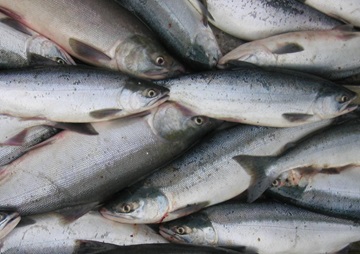 In a recent opinion piece, Brooke Woods, Linda Behnken and Nanci Morris Lyon stated, “Federal fisheries off Alaska are managed via the dictates of the North Pacific Fishery Management Council (NPFMC), which has done little to address the trawl fleet’s enormous bycatch of species immeasurably important to Alaskans.” Nothing could be further from the truth The council adopted hard caps for chinook salmon in the Bering Sea trawl pollock fisheries that vary depending upon the expected returns to western Alaska rivers. When expected returns are low, the caps are adjusted downward. Additionally, the fishing industry has stepped forward to implement chinook salmon avoidance measures that hold each vessel accountable for limiting bycatch to below the caps. In fact, the fleet is well below their caps, recognizing the need to rebuild these stocks. >>click to read<< 15:55
In a recent opinion piece, Brooke Woods, Linda Behnken and Nanci Morris Lyon stated, “Federal fisheries off Alaska are managed via the dictates of the North Pacific Fishery Management Council (NPFMC), which has done little to address the trawl fleet’s enormous bycatch of species immeasurably important to Alaskans.” Nothing could be further from the truth The council adopted hard caps for chinook salmon in the Bering Sea trawl pollock fisheries that vary depending upon the expected returns to western Alaska rivers. When expected returns are low, the caps are adjusted downward. Additionally, the fishing industry has stepped forward to implement chinook salmon avoidance measures that hold each vessel accountable for limiting bycatch to below the caps. In fact, the fleet is well below their caps, recognizing the need to rebuild these stocks. >>click to read<< 15:55
Doug Vincent-Lang
U.S. regulators will review car-tire chemical that kills salmon, upon request from West Coast tribes
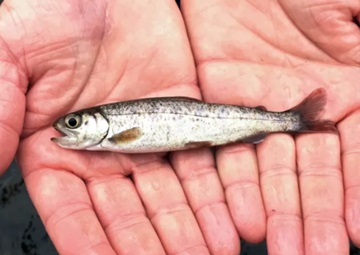 U.S. regulators say they will review the use of a chemical found in almost every tire after a petition from West Coast Native American tribes that want it banned because it kills salmon as they return from the ocean to their natal streams to spawn. The Yurok tribe in California and the Port Gamble S’Klallam and Puyallup tribes in Washington asked the Environmental Protection Agency to prohibit the rubber preservative 6PPD earlier this year, saying it kills fish — especially coho salmon — when rains wash it from roadways into rivers. Washington, Oregon, Vermont, Rhode Island and Connecticut also wrote the EPA, citing the chemical’s “unreasonable threat” to their waters and fisheries. >>click to read<< 10:14
U.S. regulators say they will review the use of a chemical found in almost every tire after a petition from West Coast Native American tribes that want it banned because it kills salmon as they return from the ocean to their natal streams to spawn. The Yurok tribe in California and the Port Gamble S’Klallam and Puyallup tribes in Washington asked the Environmental Protection Agency to prohibit the rubber preservative 6PPD earlier this year, saying it kills fish — especially coho salmon — when rains wash it from roadways into rivers. Washington, Oregon, Vermont, Rhode Island and Connecticut also wrote the EPA, citing the chemical’s “unreasonable threat” to their waters and fisheries. >>click to read<< 10:14
A business in crisis
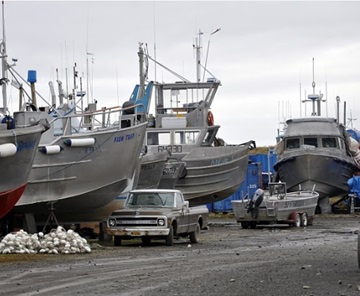 After years of choking on record runs of Bristol Bay sockeye salmon and near-record runs of heavily farmed, low-value pink salmon, the Alaska fishing industry is in chaos with processors now pleading for more government subsidies and coddled commercial fishermen demanding yet more disaster aid. One could blame global warming, which has led to historically unprecedented harvests of Alaska salmon despite whatever nonsense to the contrary the mainstream media might have reported, but the industry’s problems are far more complex than just trying to sell high-priced seafood in Western markets where the sales of animal protein are dominated by chicken, beef and pork. Some of the industry’s issues here are rooted in its long history. For most of the years after commercial fishing began in Alaska in the late 1800s, the business dealt almost wholly in canned salmon. >>click to read<< 08:41
After years of choking on record runs of Bristol Bay sockeye salmon and near-record runs of heavily farmed, low-value pink salmon, the Alaska fishing industry is in chaos with processors now pleading for more government subsidies and coddled commercial fishermen demanding yet more disaster aid. One could blame global warming, which has led to historically unprecedented harvests of Alaska salmon despite whatever nonsense to the contrary the mainstream media might have reported, but the industry’s problems are far more complex than just trying to sell high-priced seafood in Western markets where the sales of animal protein are dominated by chicken, beef and pork. Some of the industry’s issues here are rooted in its long history. For most of the years after commercial fishing began in Alaska in the late 1800s, the business dealt almost wholly in canned salmon. >>click to read<< 08:41
Sinking of the Wild Alaskan – Document Dump #42
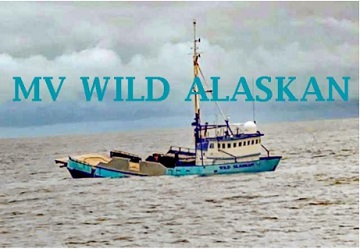 Document Dump #42 – In this Document Dump, I am releasing to the Public clear, convincing and undeniable evidence that certain Alaska State Troopers and Kodiak Chief of Police, Tim Putney are actively trying to cover-up one of Alaska’s biggest felony theft and destruction of property crimes in the history of this great state. I am a full supporter of Law Enforcement, just not the corrupt ones. As I have stated before, the actions of the Alaska State Troopers and the Alaska Bureau of Investigations have now morphed into a “HUB AND SPOKED WHEEL” RICO CONSPIRACY to cover-up a major crime which these people have no immunity from. There is no other way to explain it. Photos, >>click to read Document Dump #42<<. and more. 18:28
Document Dump #42 – In this Document Dump, I am releasing to the Public clear, convincing and undeniable evidence that certain Alaska State Troopers and Kodiak Chief of Police, Tim Putney are actively trying to cover-up one of Alaska’s biggest felony theft and destruction of property crimes in the history of this great state. I am a full supporter of Law Enforcement, just not the corrupt ones. As I have stated before, the actions of the Alaska State Troopers and the Alaska Bureau of Investigations have now morphed into a “HUB AND SPOKED WHEEL” RICO CONSPIRACY to cover-up a major crime which these people have no immunity from. There is no other way to explain it. Photos, >>click to read Document Dump #42<<. and more. 18:28
Alaska seafood harvesting jobs decline as fish crashes, pandemic and other factors take toll
Alaska fish-harvesting employment declined in 2022, a continuing yearslong slide caused by a variety of factors, according to an analysis by the state Department of Labor and Workforce Development. Employment for people harvesting seafood dropped by about a quarter from 2015 to 2022, according to the analysis, published in the November issue of Alaska Economic Trends, the department’s monthly research magazine. The industry lost ground compared to other sectors of the Alaska economy, the analysis found. Seafood harvesting accounted for 7.3% of Alaska jobs in July of 2021, but only 5.7% of Alaska jobs were in seafood harvesting in the following July. Fishery work is highly seasonal, and July is the peak month for it. >>click to read<< 16:15
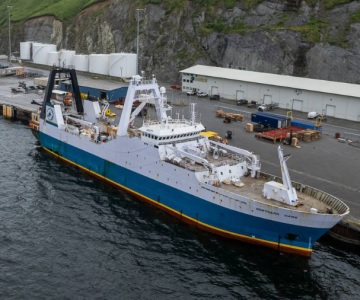
Bering Sea fish bounty brings help, headaches for trawlers
A federal lawsuit filed this year by two Alaska tribal organizations — the Association of Village Council Presidents and Tanana Chiefs Conference — seeks a court order to force federal regulators to reassess pollock harvest levels. The plaintiffs note the pollock nets, which often touch bottom, may harm crabs and other sea life and also cite the trawlers’ incidental take of salmon. The lawsuit is opposed by the At-Sea Processors Association, a group that includes Coastal Villages and had intervened in the case on the side of the federal government. “We felt compelled to do it. We don’t have any negative feelings towards them. But we think it’s kind of a misguided effort,” said Eric Deakin, Coastal Villages CEO, who works out of an Anchorage headquarters office. Photos, >>click to read<< 09:20
With little movement on salmon bycatch, Alaska advocates look to Biden administration for executive action
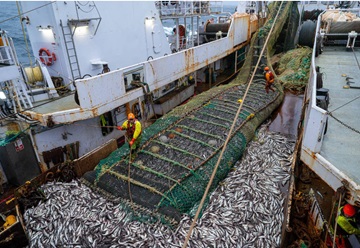 Amid catastrophic shortfalls in salmon harvests in some of Alaska’s rural, Indigenous communities, advocates have pleaded for a crackdown on unintentional catch of those same salmon by the trawl vessels that harvest billions of pounds of whitefish in the Bering Sea. But the politically appointed regional council that manages Bering Sea fisheries has largely resisted those requests. So instead, advocates are now taking another approach. They’re pushing the Biden administration for a workaround: a rewrite of the federal guidelines that tell the regional council, and its counterparts across the country, how to manage all the fisheries under their supervision. >>click to read<< 18:40
Amid catastrophic shortfalls in salmon harvests in some of Alaska’s rural, Indigenous communities, advocates have pleaded for a crackdown on unintentional catch of those same salmon by the trawl vessels that harvest billions of pounds of whitefish in the Bering Sea. But the politically appointed regional council that manages Bering Sea fisheries has largely resisted those requests. So instead, advocates are now taking another approach. They’re pushing the Biden administration for a workaround: a rewrite of the federal guidelines that tell the regional council, and its counterparts across the country, how to manage all the fisheries under their supervision. >>click to read<< 18:40
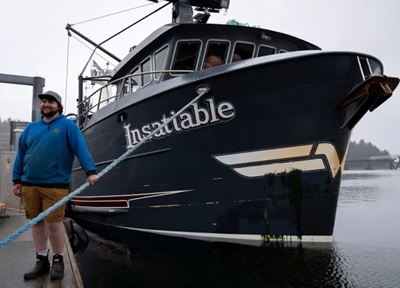
In 42 photos, See how Dungeness crab is caught off Kodiak Island, Alaska
Captain Garrett Kavanaugh of the Fishing Vessel Insatiable stands for a portrait in front of his 58’ boat at the harbor in Kodiak, Alaska. As ocean temperatures rise, fishermen everywhere must adapt to harvesting different species. Garrett Kavanaugh, captain of the Fishing Vessel Insatiable out of the port of Kodiak Island, has invested large equipment, fuel, and labor, betting on Dungeness crabs as the future of his Alaskan fishing business. >>click to read<< 20:39
Public input sought on federal management of Cook Inlet salmon fishing
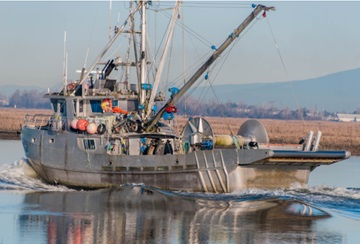 NOAA is asking for residents’ opinion on a major fishing issue. The National Oceanic and Atmospheric Administration is looking for public comments on Amendment 16 which would allow the federal government to manage commercial and recreational salmon fishing in the Cook Inlet Exclusive Economic Zone. The proposed rule would put the federal government, not the state, in charge of salmon fishing there. Alaska would continue to manage all fishing in state waters. >>click to read<< 11:31
NOAA is asking for residents’ opinion on a major fishing issue. The National Oceanic and Atmospheric Administration is looking for public comments on Amendment 16 which would allow the federal government to manage commercial and recreational salmon fishing in the Cook Inlet Exclusive Economic Zone. The proposed rule would put the federal government, not the state, in charge of salmon fishing there. Alaska would continue to manage all fishing in state waters. >>click to read<< 11:31
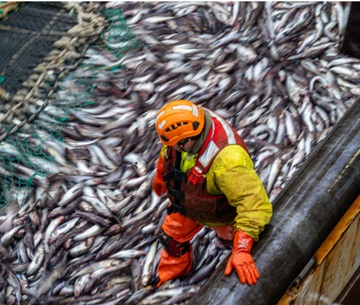
Alaska pollock trawlers are feeling pressure over salmon bycatch, so this reporter went to see for himself
Bering Sea factory trawlers scoop up tens of thousands of pollock at a time, and pressure is intensifying to avoid catching salmon as populations of chum and chinook have plummeted in recent years, causing closures for subsistence harvesting. The trawlers are not entirely to blame, warming oceans due to human-caused climate change are almost certainly a factor, but they have drawn the ire of salmon advocates from Western Alaska to Washington D.C. This is a 341-foot vessel that I went out on, the Northern Hawk, with a crew of 129 people. And most of them work below the deck in a fish factory that, basically when the fishing is reasonable, operates 24 hours a day. Then there are these incredible fillet machines that will fillet 180 fish a minute, and the job of the human is basically to just feed the machine 24 hours a day. And it’s kind of mind-numbing work. Your hands move constantly to make sure the fish are positioned correctly. >>click to read<< 07:40
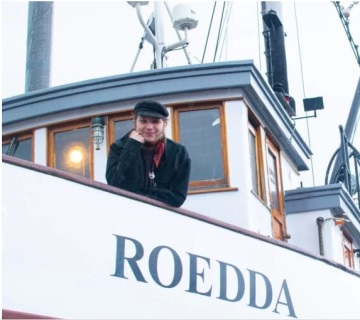
A Petersburg tender holds open mics on board, with its fish hold as the sound stage
There’s a nearly 100-year-old wooden boat in Petersburg that’s become a staple of the tight-knit local music scene. Musicians in town have a few performance spaces to choose from, a lot of them in bars. But the crew of the Roedda brings a unique option with them when they come to town — transforming the boat’s fish hold into an improvised sound stage. It was a brisk Thursday night in September in Petersburg’s South Harbor. The chill was already starting to set in, and the people were starting to pour out of town. Alex Deacon is the captain of the Roedda. But tonight, she’s also the master of ceremonies for an open mic on board — the last of the season. >>click to read<< 15:10
As the once-lucrative Bering Sea crab harvest resumes, Alaska’s fishers face challenges
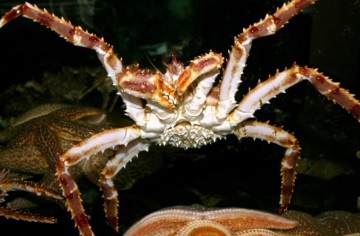 In the short term, Alaska crab fishers and the communities that depend on them will get a slight reprieve from the disastrous conditions they have endured for the past two years, with harvests for iconic red king crab to open on Sunday. In the long term, the future for Bering Sea crab and the people who depend on it is clouded by environmental and economic upheaval. The decision by the Alaska Department of Fish and Game to open harvests of Bristol Bay red king crab after an unprecedented two-year shutdown was a close call, a state biologist told industry members during a meeting on Thursday. >>click to read<< 16:08
In the short term, Alaska crab fishers and the communities that depend on them will get a slight reprieve from the disastrous conditions they have endured for the past two years, with harvests for iconic red king crab to open on Sunday. In the long term, the future for Bering Sea crab and the people who depend on it is clouded by environmental and economic upheaval. The decision by the Alaska Department of Fish and Game to open harvests of Bristol Bay red king crab after an unprecedented two-year shutdown was a close call, a state biologist told industry members during a meeting on Thursday. >>click to read<< 16:08
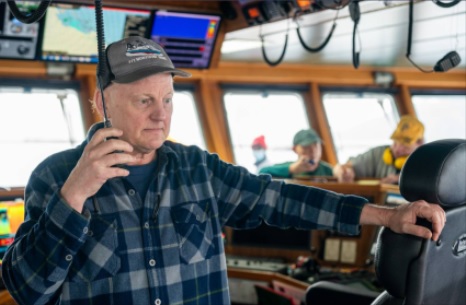
A struggle to dodge salmon in pursuit of a massive pollock bounty
Onboard the F/V Northern Hawk — Some 400 miles northwest of Dutch Harbor, Bering Sea pollock congregated in spectacular fashion. In the wheelhouse of this factory trawler, Captain Jim Egaas scanned a sonar displaying a dense red band that represented millions of fish in a school that stretched for miles. He could see the pollock up close on another screen that relayed images from an undersea camera stitched in the mesh of a quarter-mile-long net. The video feed showed swarms of them deep in the funnel-shaped trap. Once pulled on board, the tail end of the net bulged with more than 220,000 pounds of tightly packed pollock. A crewman  unstitched a seam. Raised by a powerful winch, the net spewed a silver avalanche of fish into below-deck holding tanks to await processing in a plant primed to operate 24 hours a day. Egaas was in hurry-up mode. Even before the last of this catch was shaken from the webbing, he called for crew members to unfurl a second net from a giant reel. “I like what we are seeing. We’re on the stock,” Egaas said. Photos, video, >>click to read<< 15:42
unstitched a seam. Raised by a powerful winch, the net spewed a silver avalanche of fish into below-deck holding tanks to await processing in a plant primed to operate 24 hours a day. Egaas was in hurry-up mode. Even before the last of this catch was shaken from the webbing, he called for crew members to unfurl a second net from a giant reel. “I like what we are seeing. We’re on the stock,” Egaas said. Photos, video, >>click to read<< 15:42
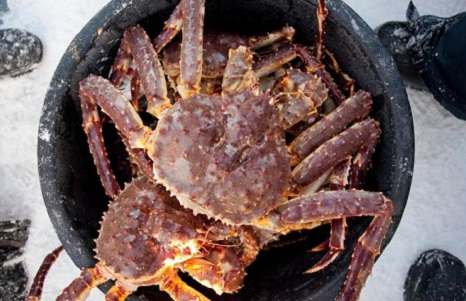
Bristol Bay red king crab, tanner crab fisheries open Sunday
The Bristol Bay red king crab fishery is back on track, after being closed for two years, with a total allowable catch of 2.15 million pounds – just a bit lower than when it was last opened in 2020 at 2.6 million pounds. The announcement on Friday, Oct. 6, was cheered by crab captains and Alaska Bering Sea Crabbers, as a way to get back out doing what they loved, pay some bills, and keep crew working, all while keeping the crab resource sustainable for generations to come. Veteran crabber Glenn Casto, captain of the FV Pinnacle, called it a start in the right direction, that will help pay some bills and help out crew. >>click to read<< 08:20
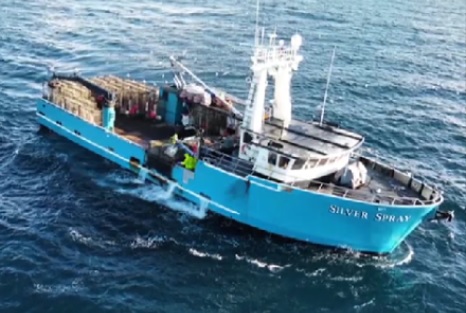
Another Bering Sea snow crab season closure brings more financial hardships for fishermen
“This is something that’s in our blood,” said Gabriel Prout, the owner and a deckhand of the 116-foot F/V Silver Spray. However, now his passion and family tradition is in jeopardy. On Oct. 6, the Alaska Department of Fish and Game announced it was closing the 2023-24 Bering Sea snow crab season for the second season in a row. “The stock is currently at all-time low levels from the survey time series,” said Ethan Nichols, the ADF&G acting area management biologist for the Bering Sea & Aleutian Islands region. “So, the threshold for opening is that total mature male biomass has to be at least 25% of long-term average. And in 2023 total mature male biomass is estimated to be between 15 and 19% of the long-term average.” The news felt like a punch to the gut for Prout, whose family relies on the season for 80 to 90% of its revenue. Video, >>click to read<< 11:40
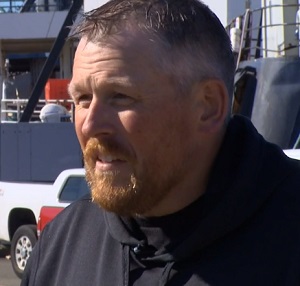
Alaska cancels snow crab harvest again due to population concerns
Crabbers from the Pacific Northwest who fish in Alaska had been watching and waiting for recommendations from the North Pacific Fishery Management Council, which met Thursday and Friday. Following the meetings, the Alaska Department of Fish and Game said Bering snow crab season will be closed for 2023-2024; Bristol Bay red king crab will open. Tanner crab will also be open for commercial fishermen. Both the snow crab and Bristol Bay red king crab seasons were closed in 2023. Crabbers and industry associations warned of the massive impact the decision would have on many small businesses, prompting calls by Congressional officials for an emergency declaration and federal aid. Video, >>click to read<< 08:18
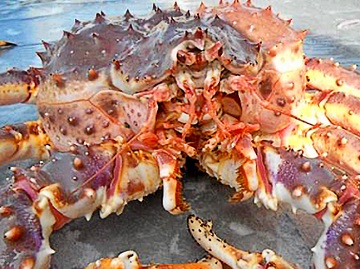
Bristol Bay red king crab fishery could return after two years on ice
The Alaska Department of Fish and Game is set to decide Friday whether or not to reopen the Bristol Bay red king crab fishery, which has been closed since 2021. Their decision will be based on recommendations from the North Pacific Fishery Management Council, which is meeting through Oct. 11 in Anchorage. During the Council’s meeting Tuesday, the Crab Plan Team presented data and analysis on Bristol Bay crab stocks from the summer trawl survey to the Scientific and Statistical Committee. Mike Litzow is a co-chair for the team and the shellfish assessment program manager and director at the National Oceanic and Atmospheric Administration’s Kodiak Lab. Litzow said while male and female crab are still at historic lows, the fishery is not at or approaching an “overfished” status. >>click to read<< 08:48

EPA fines American Seafoods nearly $1 million for Clean Water Act violations
American Seafoods Company is the world’s largest at-sea processor of Alaska pollock and holds the largest allocation of Wild Pacific Hake. The company operates a fleet of seven vessels in the North Pacific Ocean and Bering Sea. The EPA cited the company and the owners of its vessels for hundreds of violations along the Oregon and Washington coasts, including discharging waste in a protected area, failure to monitor discharges and reporting inaccurate information in required annual reports, according to a Thursday statement. “Discharge of seafood processing waste in prohibited areas and within the 100-meter depth contour of Washington and Oregon exacerbates already existing low-oxygen conditions which negatively impact most fishes, crabs and other marine life,” the EPA said. >>click to read<< 10:46
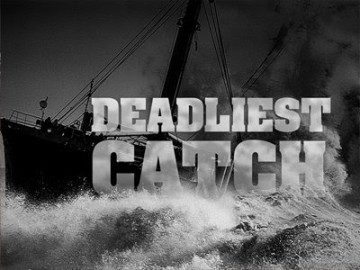
Keith Anderson Cause of Death: The Tragic Story of a Deadliest Catch Star’s Father
Keith Anderson was a retired high school counselor and the father of Jake Anderson, a fishing captain and reality TV star who co-owns the FV Saga and appears on the Discovery Channel show Deadliest Catch. Keith Anderson’s death was one of the most tragic and haunting events in the history of the show, as he went missing in 2010 and his remains were found two years later in a remote area of Washington state. What happened to Keith Anderson, and how did his family cope with his loss? Here is the story behind his mysterious disappearance and death. >>click to read<< 11:22
Alaska: 8 People Were Murdered Aboard a Fishing Boat. Though It’s the State’s Most Infamous Mass Killing, It’s Also Unsolved.
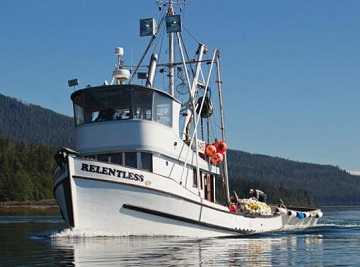 It was the men who worked on a troller named “Casino” who first noticed the fire. Thick black smoke was rising high against the misty skies of a crisp fall afternoon. A “Casino” crewmember alerted authorities in nearby Craig, Alaska, then rode their fishing boat less than a mile across the water to see if they could help. Their destination was Fish Egg Island, on the west side of Prince of Wales Island. It’s been over 40 years since the fire, the investigation and the discovery of the largest mass murder in the history of the state of Alaska. The tragedy goes unsolved, despite two trials. Residents of the fishing village of Craig have heard all the theories about who committed the horrible crimes that obliterated an entire family. Eight people were living aboard, half of whom were members of the Coulthurst family. Fishing boat veterans who had no known enemies and piloted a beautiful seine admired by the local fishing fleet. >>click to read<< 11:31
It was the men who worked on a troller named “Casino” who first noticed the fire. Thick black smoke was rising high against the misty skies of a crisp fall afternoon. A “Casino” crewmember alerted authorities in nearby Craig, Alaska, then rode their fishing boat less than a mile across the water to see if they could help. Their destination was Fish Egg Island, on the west side of Prince of Wales Island. It’s been over 40 years since the fire, the investigation and the discovery of the largest mass murder in the history of the state of Alaska. The tragedy goes unsolved, despite two trials. Residents of the fishing village of Craig have heard all the theories about who committed the horrible crimes that obliterated an entire family. Eight people were living aboard, half of whom were members of the Coulthurst family. Fishing boat veterans who had no known enemies and piloted a beautiful seine admired by the local fishing fleet. >>click to read<< 11:31
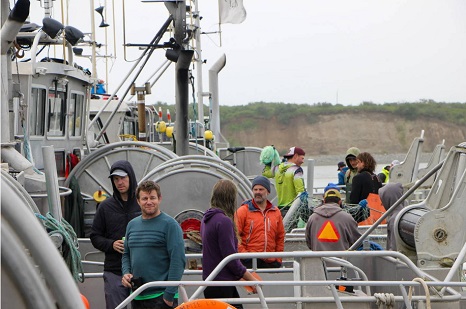
A 50-year situation: the market dynamic between fishing fleets and processors in Bristol Bay
This year, Bristol Bay’s 50 cents per pound base price had fleet members questioning the industry’s longevity. The dynamic between fleets and processors has existed for decades, with permit-holding fishing crews delivering their catch before knowing its cost, and processors relying on them to do so. KDLG’s Christina McDermott sat down with economist Gunnar Knapp, who spent decades studying Bristol Bay’s salmon markets, to learn more about the history of this relationship, and what it means going forward. Christina McDermott: Just a little background: this past summer, many fleet members were upset when the price was announced at 50 cents per pound, which is the lowest in the past 40 years when adjusted for inflation. The announcement came fairly late in the season. There was protest, and there was a lot of discussion on the processors’ respective power to set that price. And I’m interested in going back a little bit. What opportunities [did] the fleet have to sell their fish 50 years ago, let’s say, or 20 years ago? Has it always [been] this relationship [that] there are these processors and there are these fishermen? >>click to read<< 10:00






